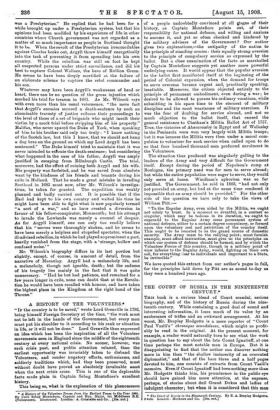A HISTORY OF THE VOLUNTEERS.* "IF the country is to
be saved," wrote Lord Grenville in 1792, being himself Foreign Secretary at the time, "the work must not be left in the hands of the Government, but every man must put his shoulder to it according to his rank or situation in life, or it will not be done." Lord Grenville thus expressed an idea which has been the inspiration of all the Volunteer movements seen in England since the middle of the eighteenth century at every national crisis. No sooner, however, was each crisis past, and public attention relaxed, than the earliest opportunity was invariably taken to disband the Volunteers, and render nugatory efforts, enthusiasms, and soldierly traditions which, had they been preserved, must without doubt have proved an absolutely invaluable asset when the next crisis arose. This is one of the deplorable facts made plain in Captain Sebag Montefiore's excellent history.
This being so, what is the explanation of this phenomenon
• 4 History of the Volunteer Forces from the Earliest Timis to the Year 1880.. By Cecil Sebag Montefiore, Captain and Hon. Major, let Middlesex B.E. (Volunteers). Illustrated. London A. Constable and Co. E15s. net.]
of a people undoubtedly convinced at all %twee of their history, as Captain Montefiore points out, of ' their responsibility for national defence, and willing and anxious to assume it, and yet so often checked and hindered by the military advisers of the Government ? Our author gives two explanations,—the antipathy of the nation to the principle of standing armies : their equally strong aversion to the principle of compulsory service as expressed by the ballot. But a close examination of the facts as marshalled by Captain Montefiore suggests yet another more powerful underlying cause. It would appear that the popular aversion to the ballot first manifested itself at the beginning of the period of Colonial expansion, when the demand for troops to serve overseas became urgent and, practically speaking, insatiable. Moreover, the citizen objected entirely to the principle of permanent embodiment, even during a war ; he desired to be allowed to pursue his ordinary vocations, while submitting in his spare time to the sternest of military discipline and the most wearisome of military exercises. It was the fear of drafting for service abroad, and not so much objection to the ballot itself, that caused the general resistance to Chatham's Militia Ballot Act of 1757. True, the victories of Abercromby in Egypt and of Wellesley in the Peninsula were won very largely with Militia troops; but it was because the Militia were then under a moral com- pulsion to volunteer for such service when called upon to do so that four hundred thousand men preferred enrolment in the Volunteers.
The situation thus produced was singularly galling to the
leaders of the Army and very difficult for the Government itself. Except during the period of Napoleon's camp at Boulogne, the primary need was for men to serve abroad; but while the entire population were eager to serve, they would only serve at home. Windham's aphorism was so far justified. The Government, he said in 1803, "had not only not provided an army, but had at the same time rendered it impossible that an army should be provided." For the other side of the question we have only to take the views of William Pitt :— " To the Regular Army, even aided by the Militia, we ought not solely to trust. In a moment so eventful, in a contest so singular, which may be tedious in its duration, we ought to superadd to the Regular Army some permanent system of national defence, either to a certain degree compulsory, or formed upon the voluntary zeal and patriotism of the country itself. This ought to be resorted to as the grand source of domestic security. The Army must be the rallying point ; must furnish example, must afford instruction, must give us the principles on which our system of defence should be formed, and by which the Volunteer Forces of this country, though in a military point of view inferior to the Regular Army, would, fighting on their own soil, for everything dear to individuals and important to a State, be invincible."
We have quoted this extract from our author's pages in full, for the principles laid down by Pitt are as sound to-day as they were a hundred years ago.






































 Previous page
Previous page